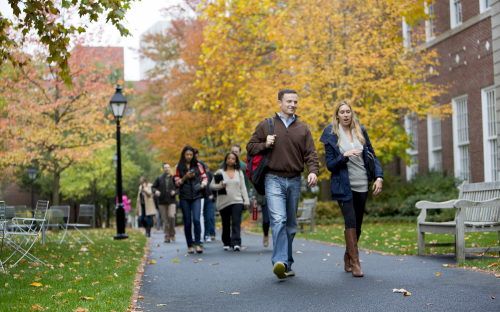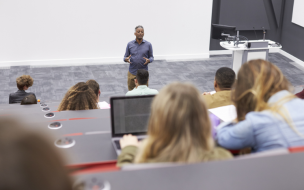Harvard Business School academics and leaders at Michigan's Ross School of Business are among those lining up to denounce Trump's policy on immigration.
The escalating anti-immigration sentiment in the US is raising concerns among business schools, who fear foreign students will be put off studying at their institutions, while companies may find it tougher to recruit them.
On Wednesday, hundreds of Ross students and faculty put on a demonstration of solidarity and support for internationals affected by Trump's controversial immigration curbs. Using the hashtag #OneRoss, they gathered on Ross' campus to listen to Dean Scott Derue and student Jerry Won, president of the Ross Student Government Association, speak. Attendees distributed and wore red pins representing cultural tolerance and racial diversity, Michigan Daily reported.
“We are from the US, we are from Iran, we are from Somalia,” said Scott. “We are all global citizens, and we will demonstrate an unwavering commitment to a diverse and equitable community where we can all come together, live together and work together.”
On Tuesday, several leading HBS professors condemned in an online post Trump’s executive order, which placed restrictions on travellers from seven Muslim-majority countries.
Professor David B Yoffie said: “President Trump’s policy is a disgrace. It is a lazy person’s policy answer to a complex problem that was poorly conceived, inadequately reviewed, discriminatory, counterproductive, and fundamentally anti-American.”
Christine Exley, an assistant HBS professor, said: “Donald Trump's recent executive order is indefensible. We must welcome the brightest students, researchers, and innovators, without regard to national origin or religion, to continue to prosper economically.”
Any tightening of the visa regime would negatively impact US business schools’ ability to recruit the foreign students upon which they rely.
“Certain political decisions like Brexit might affect the interest in certain markets and that could benefit us in continental Europe,” Martin Boehm, the Dean of IE Business School, told BB, without specifically naming Trump.
A survey from the Graduate Management Admissions council released last month suggested that 37% of non-US b-school applicants said Trump made them less likely to study in the country.
Most top-tier MBA cohorts are comprised of at least 30% international candidates, whose diversity enriches the classroom experience.
This week reports began to emerge of top-tier business school students who are now effectively shut out of the US as a result of Trump’s order.
HBS’ David said he had received an email from a distraught student who was born and raised in one of the banned countries and held a Canadian passport.
“Her family was located in Canada and the United Kingdom. Suddenly she was faced with an impossible choice: stay in the United States to pursue her passion in technology and risk not seeing her family for a long time; or visit her family in Canada or the UK, and risk losing her livelihood,” David said.
Scores of business leaders have attacked the immigration clampdown. Executives at Goldman Sachs, Citigroup and MasterCard, the carmaker Ford and beverage group Coca-Cola have all criticized the restrictions.
Several tech executives have also condemned the order. From the large companies such as Google, Apple and Facebook to private “unicorns” such as Airbnb and Lyft, chief executives spoke out against the ban under pressure from distressed employees.
“The tech industry has thrived by capturing our best students — regardless of origin — and giving them exciting jobs, which helps make America one of the most innovative countries in the world,” said HBS’ David, who, like many Americans, is the grandchild of immigrants.
“Restricting the free movement of talent does not make America safer or produce more jobs. In fact, it does the opposite.”
Boris Vallée, HBS assistant professor, said: “Shutting down the country to immigration from certain countries has the potential to reduce the competitiveness of the US in the long run, as it mechanically restricts the pool of applicants.”
Despite the challenges, academics remain optimistic and resolutely opposed to Trump’s immigration curbs.
Katy DeCelles, visiting associate professor at HBS, said: “I opened my class today echoing the Harvard president and HBS dean that all voices, religions, nationalities and values belong at Harvard and are valued in my classroom.”
RECAPTHA :
cb
37
d6
a9








